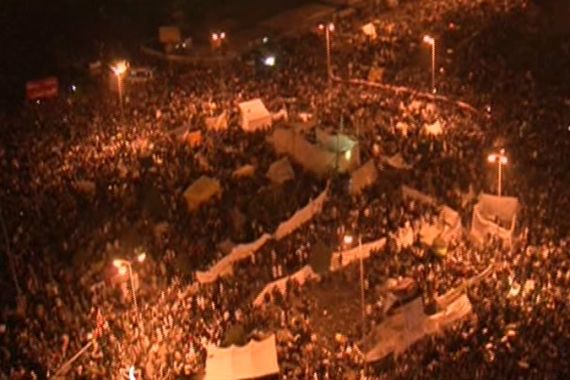Reports: Egypt to form emergency government
Military said to agree to “national salvation government” to make way for transfer of power to civilian government.

Egypt’s ruling generals have offered to transfer power to a civilian president by July in a dramatic attempt to placate protesters and defuse a political crisis that has shaken plans for the country’s first free election in decades.
The military council, in power since Hosni Mubarak, the former president, was overthrown on February 11, also agreed on Tuesday night to at a meeting with politicians to accept the resignation of Prime Minister Essam Sharaf’s cabinet and to replace it with a national salvation government within days to steer Egypt to civilian rule.
“We agreed on July as the month to transfer power to a civilian president,” one participant, Emad Abdel Ghafour, head
of the Salafi Islamist Nour (Light) Party, told Reuters.
He said a president would be elected in June ahead of a power transfer in July. Under the previous army timetable, the
vote might not have taken place until late 2012 or early 2013.
Ghafour and other politicians at the meeting said parliamentary elections would start as planned on Monday.
The concessions have been wrenched from the military by five days of protests against army rule in Cairo’s Tahrir Square and elsewhere amid violence that has cost at least 33 lives.
Protests intensify
Throughout Tuesday, a crowd reaching as many as 100,000 protesters filled Tahrir Square. Thousands also gathered in Alexandria.
The gathering protesters were said to be answering an earlier call for a million people to join the mass demonstrations and intensify pressure on Egypt’s military leaders to hand over power.
As the crowds continue to grow, Field Marshal Hussein Tantawi, Mubarak’s defence minister of two decades and the head of the Supreme Council of the Armed Forces (SCAF), was expected to address the nation.
Al Jazeera’s Mike Hanna, reporting from Tahrir Square, said: “There are tens of thousands who have gathered virtually across Egypt’s political spectrum.”
The Muslim Brotherhood was the only major political group that announced it would not be at Tuesdays demonstrations. In a statement the group said it did not want to be involved in a protest that may delay Monday’s elections.
Sources said the SCAF had approached Mohamed ElBaradei, a presidential hopeful and opposition politician, to form a new interim government. ElBaradei was said to be hesitating over assurances regarding his authority to choose cabinet ministers.
The office of leading pro-reform activist did not attend the crisis meeting but has reportedly been in touch with the military.
‘Inflame emotions’
Our correspondent said there was a massive Egyptian flag being carried by a few hundred protesters, many of whom were shouting anti-military slogans.
“The people want the fall of the marshal,” protesters chanted, referring to Tantawi.
“This land belongs to Egyptians. It is not for sale and does not need any guardians,” one banner read. “All Egyptians demand an Egypt run by civilians,” read another.
Dina Ahmed Hassan, an activist, said she felt it was her duty to come to Tahrir Square.
“I wanted to see the truth,” Hassan said. “We’re calling for an end to the violence against the Egyptian youth who don’t have any weapons at all”.
In Tahrir Square a mass funeral took place for a protester who was killed on Saturday during clashes between the security forces and protesters. The coffin was carried on the shoulders of protesters who chanted slogans against the ruling military council.
Al Jazeera’s Hanna said: “Parading that dead body in the square is certainly something that is going to inflame emotions.”
‘Largest gathering’
Criticism of the military has spread in recent days. Amnesty International, the human rights organisation, said the ruling generals had “been responsible for a catalogue of abuses which in some cases exceeds the record of Hosni Mubarak”.
In the report published on Tuesday, Amnesty said Egypt’s military rulers had “completely failed to live up their promises to Egyptians to improve human rights”.
On Monday evening, Victoria Nuland, a US State Department press officer, described the violence as “deplorable” and urged elections to take place on time.
Elsewhere in Egypt on Tuesday, some 5,000 people surrounded a police headquarters in the northern coastal city of Alexandria, the same place where police had responded by firing live ammunition on Monday night.
“This is perhaps the largest gathering we have seen in Alexandria in the past few days,” Al Jazeera’s Rawya Rageh, reporting from Alexandria, said
Security forces also battled about 4,000 demonstrators in the port city of Ismailia on the Suez Canal on Monday, witnesses said.
“Certainly the violence we have seen leaves a lasting mark on the protesters and on the society as a whole,” Hanna said.